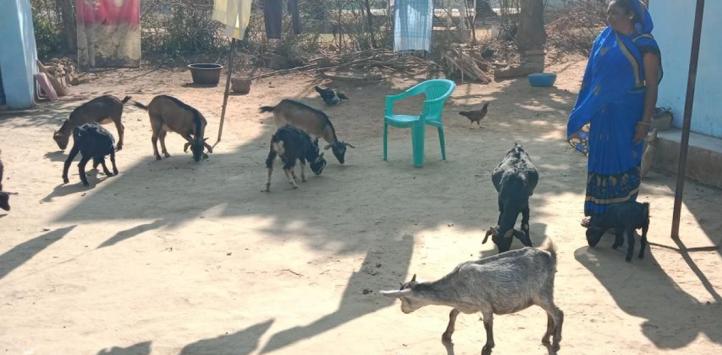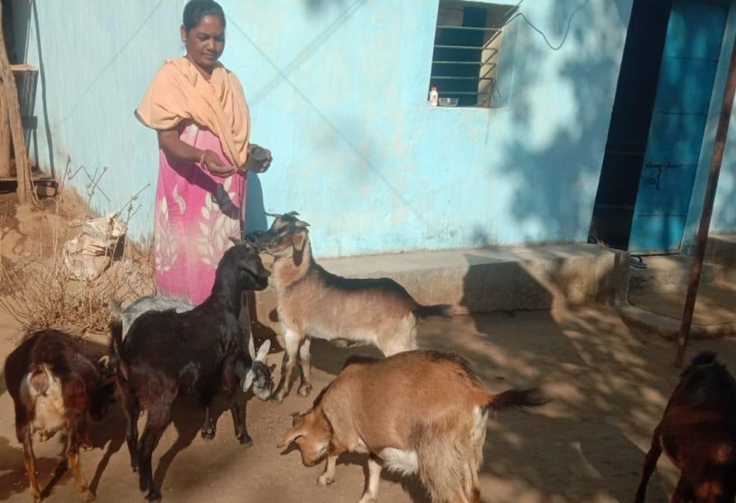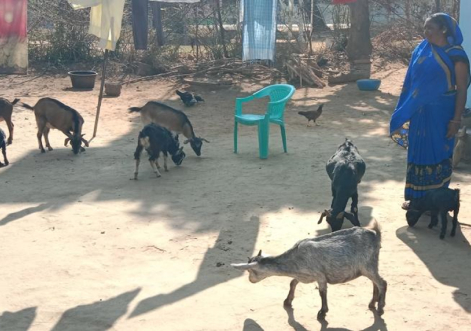Keshmati solving her Home-Problems with Home-Made solutions by Bijay Roul, Simdega
- Home
- Stories of Change
- Keshmati solving her Home-Problems with Home-Made solutions by Bijay Roul, Simdega
Sunil Barwa had started a new chapter of his life. College. He was extremely excited to meet new friends and teachers, stay in a hostel, and know new things from his classroom lectures. The gate of his college opened a new horizon for Sunil – none else from his family had ever completed school education.
But, Sunil couldn’t finish his graduation. Rs. 12,000 to 15,000 a year from agriculture. That was all his parents could manage to earn to meet all the needs of all the five members in the family. How could they pay for his hostel and tuition fees? Sunil had two more siblings, and he was the eldest of all. He came back to his village, named Paro, in Bano block of Simdega district in Jharkhand and started a photostat shop. Bhikham was seeing a new ray of hope in his son’s business. Keshmati, Sunil’s mother, was sad.
Keshmati Devi (45) is a medium-built woman would toil all day in monsoon, on their 1.7 acres of land to grow paddy, potatoes, and vegetables, to ensure everyone in the family gets to eat all round the year, and pay for daily necessities. But with just about Rs. 15,000 a year, managing the whole family’s expenses was getting tougher. “Everything in the market was becoming costly, but our income didn’t increase proportionately. Paying for our children’s education and their hostel fees seemed impossible after a point. When Sunil came back after quitting college, it broke my heart. I had a dream that one day he will complete his studies and get into a job to earn a salary every month,” reminisces Keshmati.

On the other side of despair:
Keshmati realized it’s time for her to walk a few extra miles to ensure the other two children don’t have to stop their education. She thought if she rears goats and sells them in the market when they grow big, it will help her with ready cash in hand.
Likewise, in 2020, she purchased two goat kids from the local market, to rear them, in the hope of some subsidiary income by selling them once they grow bigger. Least she knew about proper care and hygienic rearing practices, crucial for arresting various diseases and premature deaths of goats. Within a few days she lost both the kids to a disease.
“I couldn’t find the reason for their death. What bothers me more is I was clueless about what all I could have done to save them!" Keshmati’s voice trembles as she thinks of those days.
Earning more money was the quest, but Keshmati ended up losing more. A few months down the line, Keshmati came to know Anima Aind, a Pashu Sakhi working in the area under the AssET project, supported by the ICICI Foundation implemented by PRADAN. Keshmati told about her saga to Anima. “It’s not possible for you to take care of every aspect a goat needs. We all need expert help. Keshmati, please join the induction event I am arranging in the Paro village SHGs, I am sure it will help you understand what you need to do. Trust me, rearing goats can help you change your fortune”. Anima’s words rekindled Keshmati’s hope. In the event, she learned about the benefits of livestock rearing in the Producer Group (PG) promoted under the project. Anima explained how a PG could help increase their income - by offering all kinds of goat-rearing services at her doorstep. But what attracted Keshmati the most was the provision for ethno-vet services under the PG in which, as a rearer she will have to bear the cost of locally available ingredients used in the treatment, such as onion, turmeric, aloe vera, harida (terminalia chebula), etc. EVM makes farmers self-reliant to care for their livestock to a great extent.

Lessening dependence on external support and services:
Keshmati was determined to start rearing goats once again. She became a member of the Beli Producer Group where she received a great deal of knowledge and several trainings on ethno-vet practices. Keshmati purchased two Black Bengal goats from the market immediately after the training. After a few days, one of them started showing symptoms of diarrhea. It was like a déjà vu for Keshmati, but this time, she was several steps ahead of her previous attempt. She took 4-5 onions and 4-5 spoons of cumin seeds, grinded and mixed them, and applied the medicine to the suffering kid. The medicines started showing results within two days. She hardly spent Rs. 40 for the ingredients. Had it been any veterinary doctor or expert, Keshmati would have been charged a minimum of Rs. 300 to treat the goat.
Recalling her earlier goat rearing experience, Keshmati covers her embarrassed smile with the edge of her saree, and says, “I used to take the goat kids to the same doctor who prescribes medicine to humans. I should have understood that human and animal bodies are different and their treatment should also be different! But now, the trainings I received at the PG have enabled me to prepare medicines right at home, using ingredients that don’t cost much at all."
Rearing assets through low-cost management:
Keshmati joined the group with just five goats; now she has 13 goats (6 males, 6 mother goats, and 1 kid). In fact, she has also started rearing country chickens and currently rears over 75 birds. She says that although the local treatment works a little slower, it is the best treatment that anyone could afford in times of emergency. “I can’t let anything come in between my children’s education. That’s the reason I am enhancing my income by rearing small ruminants”, she claims proudly. This year, she earned about Rs. 17,000 by selling two male goats, which she has spent to admit her daughter and younger son in school.
Producer Groups as cross-learning forum:
It’s not Keshmati alone. Thirty other women rearers are being supported by Producer Groups (PGs). These PGs are emerging as cross-learning forums for livestock rearing. Moreover, homemade treatments have helped reduce dependencies on external support and make farmers self-subsistent while scaling up the farmers to consider livestock an important livelihood. As a result, not only has the mortality reduced but the treatment cost has also been minimized to a great extent. Sharing of experiences among PG members on a regular basis facilitates cross-learning among them, enhancing their confidence. The learning experiences of rearers like Keshmati are helping others to become progressive farmers and local entrepreneurs to create a viable livelihood in the village and for others to emulate.


